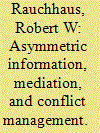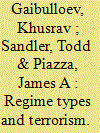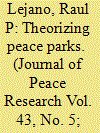|
|
|
Sort Order |
|
|
|
Items / Page
|
|
|
|
|
|
|
| Srl | Item |
| 1 |
ID:
074557


|
|
|
|
|
| Publication |
2006.
|
| Summary/Abstract |
This article examines mediation in conflicts using both a game-theoretic model and a quantitative analysis. The game-theoretic model suggests that mediator effectiveness rests primarily on the ability of third parties to provide critical information about the disputants' reservation points. The empirical analysis finds that mediation that targets asymmetric information is a highly effective form of conflict management. Moreover, the results suggest that mediation outperforms other forms of third-party intervention, including those that entail coercion. Both the model and quantitative analysis indicate that impartial mediators will generally outperform biased ones. Along with providing new information on conflict management, the quantitative analysis also has broader implications for IR theory. The results provide empirical support for the rationalist claim that asymmetric information is one of the root causes of war.
|
|
|
|
|
|
|
|
|
|
|
|
|
|
|
|
| 2 |
ID:
154542


|
|
|
|
|
| Summary/Abstract |
Regime type has opposing effects on terrorism. If a regime constrains the executive branch, then terrorism may be more prevalent. If, however, a regime allows all viewpoints to be represented, then grievances may be held in check, resulting in less terrorism. Regimes that value constituents’ lives and property will also act to limit attacks. We formulate a game-theoretic model, containing a terrorist group and targeted government, that captures these opposing forces and supports a nonlinear relationship between regime type and terrorism. This model indicates how diverse samples in the literature can result in different relationships between regime type and terrorism. Seldom does it support the positive relationship that is prevalent in the terrorism literature. We apply a large variety of empirical techniques to show that regime type has a robust inverted U-shaped impact on various terrorism measures. Foreign policy variables (e.g., alliance with the United States) are not a robust influence on terrorism.
|
|
|
|
|
|
|
|
|
|
|
|
|
|
|
|
| 3 |
ID:
073580


|
|
|
|
|
| Publication |
2006.
|
| Summary/Abstract |
In a reversal of the historical role of territory in intergroup conflict, the article focuses on an emergent notion of territory as an instrument for peace. In this article, the author begins to theorize about the mechanisms by which so-called peace parks might act in resolving conflict and ushering in regional stability. Two models are utilized that differ in their portrayal of how these parks might work. The first model, built on a game-theoretic foundation, provides insight into incentive mechanisms by which parties might agree to a border park. Furthermore, the model sheds light on whether these parks might serve as vacant buffer zones or, alternatively, active zones of cooperation. However, the game-theoretic model should be complemented by another, qualitative model that focuses primarily on how these interactions are embedded in history, culture, tradition, and group identity. To this end, the author develops a second model, which portrays institutions as structures of care. In the model of care, relationships are constitutive of identity, and institutions and practices (including war and peace) evolve in coherence with the web of relationships. It is the employment of mutually complementing analytics that might afford a deeper understanding of how these peace parks might actually serve as effective bridges for peace.
|
|
|
|
|
|
|
|
|
|
|
|
|
|
|
|
|
|
|
|
|